Hey there!
Looking to launch your own multi-vendor marketplace? A multi-vendor platform allows different sellers to list and sell their products through a single storefront. It’s ideal for businesses aiming to scale fast and manage multiple vendors efficiently. In this guide, we’ll explore the best multi vendor marketplace platforms available in 2025, compare their features, and help you choose the right solution tailored to your business needs. Whether you’re a startup or an enterprise, this blog will simplify your decision-making process.
According to storehippo’s Report, Multi Vendor Marketplaces are expected to generate $8.7 trillion in sales by 2025.
Let’s get to the point!
This blog covers everything you need to know about multivendor marketplace platforms. We’ll discuss their main benefits, challenges, and the top 6 best multi vendor marketplace platforms to consider.
Whether you need scalability, customization, or easy vendor management, this guide will help you understand these multi vendor platforms and pick the best one for your business.
Launch your Best Multi vendor Marketplace Platform Now!
Key Takeaways On Best Multi Vendor Marketplace Platform
- Understand the concept of a multi vendor marketplace platform, where multiple sellers offer their products or services under one digital storefront, providing customers with a wide variety of choices.
- These best multi vendor marketplace platforms benefit to create value for platform owners, vendors, and customers by offering features like reduced marketing costs, diverse product options, and centralized management.
- Overcoming the challenges like managing vendors, handling competition, and ensuring secure payments need smart solutions. Good planning can solve these problems to build a best multi vendor marketplace platform
- Build a successful platform to get insights on how to build a best multi vendor marketplace platform, including choosing the right platform, designing and developing the platform, and testing and launching.
- Selecting the best multi vendor marketplace platform to match your business goals, including platform flexibility, integration capabilities, and long-term support options.
What is a multi vendor marketplace platform?
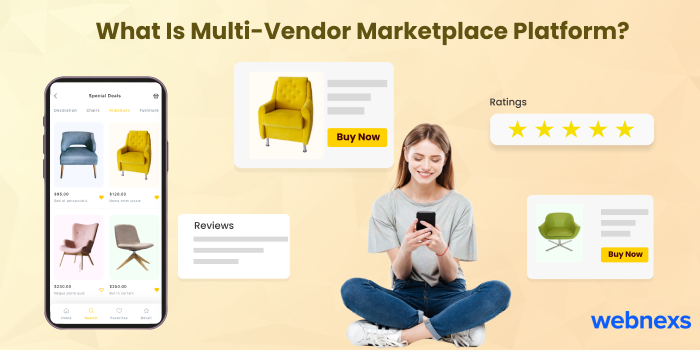
Multi vendor marketplace platform is an ecommerce platform that allows multiple vendors to sell their products or services through a single website or app.
It’s similar to a virtual shopping mall, where each vendor operates their store, while the marketplace owner manages the entire site. This type of platform has become increasingly popular in recent years, with examples like Amazon, eBay, and Etsy.
With this kind of online marketplace software, businesses can create a unified software where sellers handle their products, and the marketplace takes care of payments, transactions, and commissions.
Why Choose a Multi Vendor eCommerce Platform?

Finding the right ecommerce marketplace software is essential for your online business’s success. With so many options out there, it can feel challenging to pick the perfect fit.
Here’s a 5 simple steps to help you choose the best multi vendor marketplace software:
- Identify your business needs
- Look for key features
- Assess scalability
- Prioritize security and support
- Read user reviews
1. Identify Your Business Needs
Start by figuring out what your business requires. Consider,
- Type of Products
Consider what you’ll be selling. Certain software are better equipped to support specific types of products, so choose one that fits your needs.
- Vendor Capacity
How many vendors do you plan to onboard? Some multi vendor marketplace software has limits, so keep that in mind.
- Payment Options
Which payment methods do you want to support? Make sure the software can accommodate your preferences.
- Geography
Identify the regions you plan to serve. Some software may offer better support for international transactions, shipping, and tax handling.
- B2B/B2C Marketplace
Determine whether your business will serve other businesses (B2B) or individual consumers (B2C). This will influence software features, customer experience, and transaction processes.
2. Look for Key Features
Focus on features that will improve the experience for both vendors and customers. Here are some must-haves
- Vendor Management
Ensure the software makes it easy for vendors to manage their profiles and products.
- Order and Shipping Management
Find tools that help vendors handle orders and shipping efficiently.
- Multi-Pickup Shipment Partner
Choose a software that connects with multiple shipping partners. This feature enables vendors to provide various shipping options for customers, enhancing delivery speed and reliability.
- Customization Options
A software that allows you to customized its look and feel to match your brand is a big plus.
3. Assess Scalability
Choose the best multi vendor marketplace software that allows you to add more vendors and handle increased traffic without needing major changes.
4. Prioritize Security and Support
Make sure the marketplace software offers strong security measures to protect sensitive data. Also, check for reliable customer support to help you resolve any issues quickly.
5. Read User Reviews
Before making a decision, take some time to read reviews and testimonials from other users. They can provide valuable insights into what you can expect from the software.
How does the multi vendor marketplace platform work?
Multivendor marketplace is a platform where multiple sellers sell their products to customers through a single website. The platform owner, or admin, manages the website and oversees the buying and selling process. Vendors register and list their products, and customers can browse and purchase from various sellers.
The platform handles orders, payments, and customer support, making it a convenient and streamlined experience for all parties involved.
Advantages
- For Vendors
They can reach a wider audience without the need to manage their storefront.
- For Customers
The platform offers variety, convenience, and competitive prices, making it a preferred shopping destination.
- For Platform Owners
Revenue streams include commissions, subscriptions, and ads, enabling substantial profitability.
Did you know?
- Consumer Preference – 47% of global online purchases are made via marketplace platforms.
- Direct Navigation – 48% of online shoppers navigate directly to multi vendor marketplaces when buying online.
- Growth Rate – The global multi vendor ecommerce platform market is expected to grow at a CAGR of 22.5% from 2020 to 2027.
Top Multi Vendor Marketplace Platforms in 2025 Comparisons
Comparing the best multi vendor marketplace platform is the key step you should consider before choosing the right multi vendor software because it is one that going to power your whole marketplace business.
No marketplace software has ever been born that handles all types of marketplace business ideas and if focused on a particular area, it is more likely to be a good fit for you.
But what affects the choice of marketplace software you choose?
- Selling products or services
- Whether it is C2C, B2B, or B2C
- Getting into a website or a mobile app
Here’s a comparison table format for choosing the best multi-vendor marketplace Platform:
| Factor | Webnexs | Wcart | Shopify | CS-Cart | Yo!Kart | Magento |
|---|---|---|---|---|---|---|
| Ease of Use | Easy onboarding | Simple for all users | Easy but needs apps | Intuitive for all | Easy for users, slight learning | Complex, needs tech skills |
| Customization | Highly flexible | Custom design options | Limited without apps | Custom vendor stores | White-label and UI options | Fully customizable |
| Scalability | Grows with you | Great for growing stores | Scales with add-ons | Handles large marketplaces | Scales from small to big | Enterprise-level scaling |
| Security | Strong and secure | Encrypted & safe | PCI compliant | Multi-layered protection | GDPR-ready & secure | Advanced, regularly updated |
| Payment Integration | Supports many gateways | Multiple methods available | Wide range via apps | Flexible payment setup | Global gateways supported | Extensive options, needs setup |
| Mobile Optimization | Fully responsive | Mobile-friendly UI | Optimized with apps | Mobile-ready out of the box | Mobile-ready with PWA | Responsive with PWA support |
6 Best Multi Vendor Marketplace Platforms to Transform Your 2025 Business
As online shopping continues to grow, choosing the right multi vendor marketplace software is key to success. According to a report by Fortune Business Insights, the global multi-vendor support services market was valued at USD 53.27 million in 2023 and is expected to reach USD 69.87 million by 2032, growing at a 3.1% annual rate. This highlights the importance of selecting a platform that can scale with your business.
Here are the top 6 multi vendor marketplace platform to consider in 2025!
- Webnexs
- Wcart
- Yo!Kart
- Shopify-Plus
- CS-Cart
- Magento
1. Webnexs
“Best Multi Vendor Marketplace Platform for Customization & Growth”
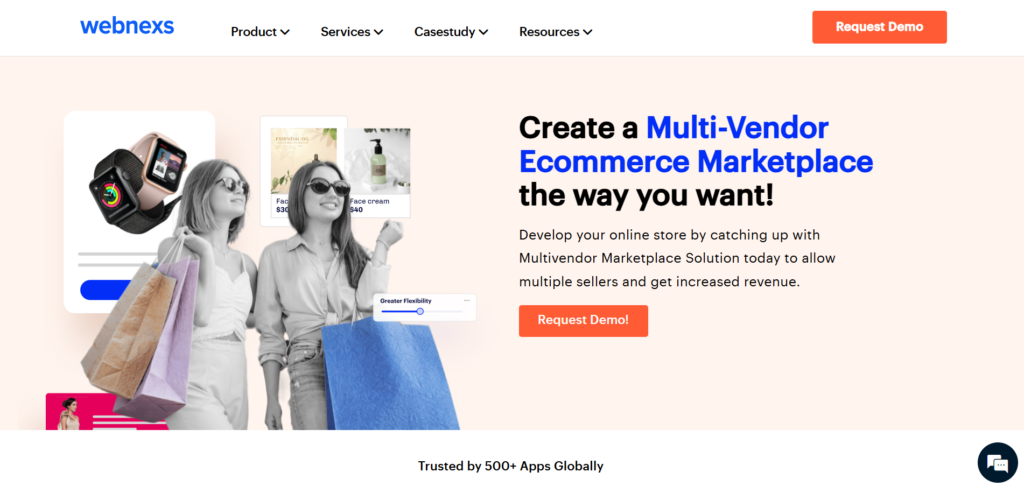
Webnexs is a powerful place for creating the best multi vendor marketplace platform. It offers customizable features and tools that simplify managing vendors and the marketplace.
Features
- Modules for customizing storefronts, managing inventory, and generating reports.
- Bulk uploading and vendor-specific product listings for smooth vendor management.
- Advanced order tracking with return and payout options for vendors.
- SEO tools and customizable email and invoice templates.
- Support for multi-currency and delivery restrictions using PIN code verification.
Advantages
- It makes vendor management easier with bulk uploads and tracking tools.
- Improves search engine visibility and enables better customer communication.
- Supports local and international customers with multi-currency and delivery options.
Benefits
- Vendors save time managing products, boosting their productivity.
- Businesses attract more customers and build trust through improved branding.
- Customers enjoy a smoother, more reliable shopping experience.
2. Wcart
“Best Multi-Vendor Marketplace Platform for Startups to Enterprises”

Wcart is known for its flexible and scalable design. It’s built to help businesses stay ahead by offering features that adapt to future needs.
Features
- Flexible headless architecture for fast and efficient performance.
- Integrated multi vendor marketplace payment gateway and shipping options
- Role-based controls and plan-based vendor management.
- Affiliate marketing tools and options to upsell or cross-sell products.
- Mobile app support with regular updates for a better experience.
Advantages
- Provides flexible and fast performance that adapts to business needs.
- Simplifies payments and shipping for vendors and customers.
- Marketing tools help businesses promote products and increase sales.
Benefits
- Businesses can grow and adapt without major changes.
- Customers enjoy faster checkouts and better shopping experiences.
- Marketing features boost sales and attract more buyers
3. Yo!Kart
“Best Multi-Vendor Marketplace Platform for Startups and Enterprises”
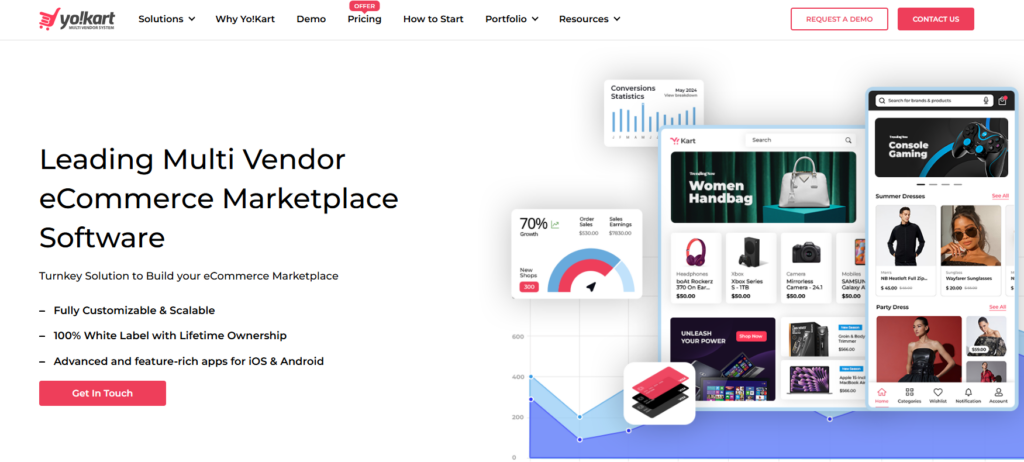
Yo!Kart is a readymade and white-label ecommerce marketplace solution that allows entrepreneurs and business owners to launch their feature-rich multi-vendor ecommerce marketplace effortlessly.
Features
- User-friendly UX/UI and easy content management system.
- Robust admin and seller dashboards to control and manage operations easily.
- Advanced SEO, marketing and analytics tools to boost sales and make data-driven decisions.
- Multilingual and multi-currency support alongside 20+ pre-integrated payment gateways.
- Pre-integrated Tax Jar and Avalara APIs for automated and real-time tax calculation.
Advantages
- Fully customizable and scalable marketplace platform.
- Self-hosted software that allows you to host the platform on your preferred server.
- Provides source code ownership offering complete control over the software.
Benefits
- Free installation and up to one year of free technical support.
- Buyer Mobile Apps for Android and iOS.
- License available for a lifetime product ownership at one-time payment with no recurring charges.
4. Shopify Plus
“Best Multivendor Marketplace Platform for Large-Scale Businesses”
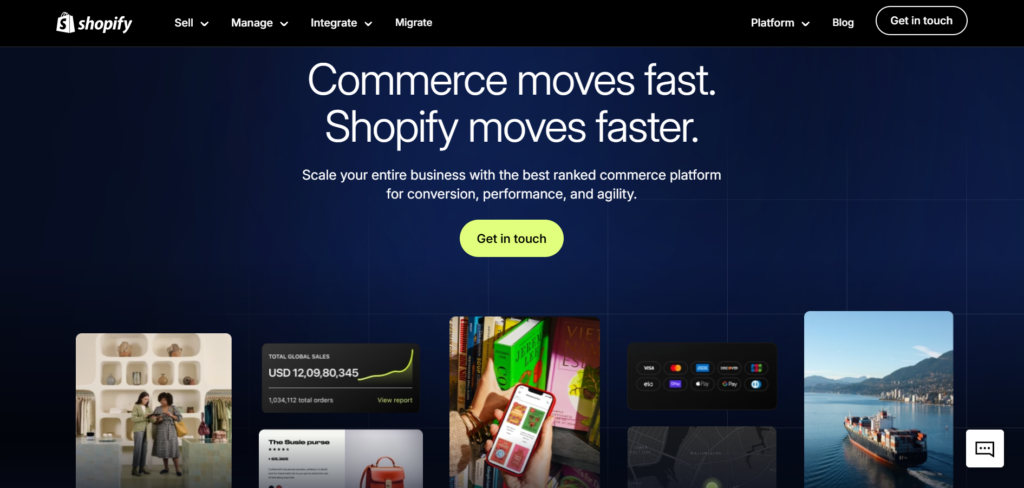
Shopify Plus is a trusted platform for large-scale businesses. It’s easy to use, highly scalable, and supports unlimited vendors and products.
Features
- Unlimited vendor and product listings for high-volume businesses.
- Mobile-friendly designs and customizable themes.
- Integrations with apps for marketing, shipping, and analytics.
- Fast and secure checkout processes for better conversions.
- Reliable hosting with 99.9% uptime.
Advantages
- Handles large-scale operations with ease, perfect for big marketplaces.
- Provides fast, mobile-friendly designs for a smooth shopping experience.
- Integrations save time and simplify operations.
Benefits
- Businesses can grow without worrying about limits.
- Customers enjoy quicker transactions and attractive designs.
- Easy operations help businesses focus on growth and customer satisfaction.
5. CS-Cart
“Best Marketplace Platform for Vendor Management & Flexibility”
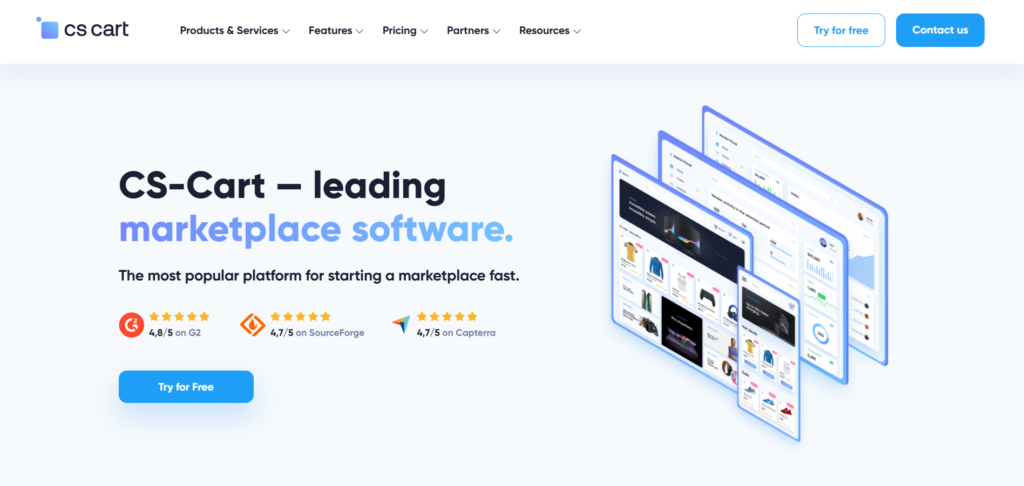
CS-Cart Multi Vendor is a complete solution for managing vendors and storefronts. It works well for global businesses with support for multiple languages and currencies.
Features
- Vendor dashboards with detailed analytics for better decision-making.
- Flexible payout systems and commission settings for vendors.
- Built-in SEO tools and marketing features for more visibility.
- Multi-language and multi-currency support for global reach.
- Drag-and-drop tools for easy storefront customization.
Advantages
- Vendor dashboards help track performance and improve management.
- SEO and multilingual features make it easier to attract global customers.
- Flexible commissions suit different vendor needs.
Benefits
- Vendors can manage stores better and grow faster.
- Businesses can reach a wider audience and increase sales.
- Customization tools make each vendor’s store unique and appealing.
6. Magento
“Best Multi Vendor Marketplace for Scalability & Performance”
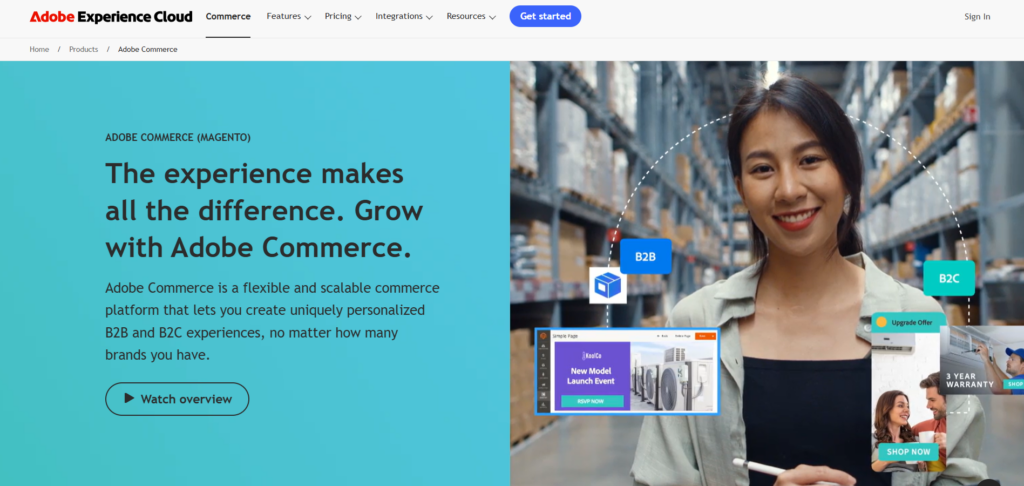
Magento Marketplace is an open-source platform owned by adobe with powerful customization options. It’s perfect for businesses looking for flexibility and scalability.
Features
- Open-source platform with unlimited customization options.
- Extensions to add advanced multi vendor features.
- Built-in tools for discounts, coupons, and promotions.
- Easily scales as the business grows.
- Backed by a large community for updates and support.
Advantages
- Fully customizable to fit unique business needs.
- Promotion tools help attract and retain more customers.
- Community support ensures regular improvements and security.
Benefits
- Businesses can create a marketplace that fits their goals.
- Customers get better deals, making them more likely to return.
- The platform stays up-to-date and reliable with community help.
Build Your Dream Multi Vendor Marketplace Platform Now!
How to Choose the Best Multi Vendor Marketplace Platform for Your Business
Building a multi vendor marketplace platform can be a complex task, but you can create a successful online marketplace with a clear plan and the right tools. Here’s a step-by-step guide to help you get started.
6 Simple Steps to Get Started!
- Define Your Niche
Identify a specific market or niche for your platform. This will help you target a particular audience and vendors. - Conduct Market Research
Research your target audience, needs, and preferences. Analyze your competitors and identify gaps in the market. - Create a Business Plan
Develop a comprehensive business plan that includes your mission, goals, target audience, marketing strategies, and revenue models. - Choose an Ecommerce Platform
Select a suitable ecommerce marketplace solution that supports multi vendor marketplaces, such as Webnexs, Wcart, or Shopify. - Design and Develop Your Platform
Design and develop your platform, including the user interface, payment gateways, shipping integrations, and vendor management tools. - Test and Launch
Test your platform thoroughly and launch it to the public.
Tips for your success!
- Start Small – Begin with a small group of vendors and gradually scale up your platform.
- Focus on User Experience – Ensure your platform provides a seamless and user-friendly experience for customers and vendors.
- Monitor and Analyze Performance – Regularly track and analyze your platform’s performance to identify areas for improvement.
Benefits of Building a Multi Vendor Marketplace Platform
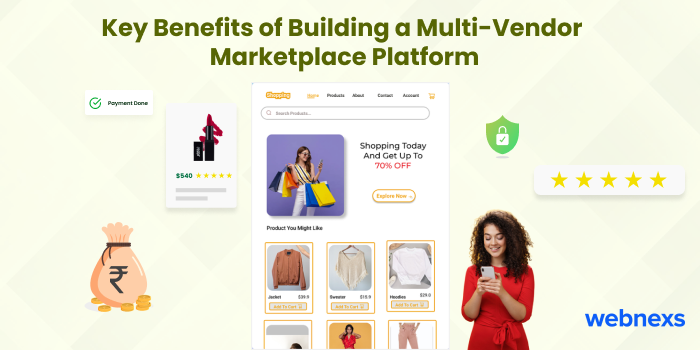
Earlier, we talked about what a multi vendor marketplace platform is, explored the top 6 best platforms to build one, and covered the steps to create it.
Now, let’s look at the benefits it offers. Whether you’re a platform owner, vendor, or customer, there’s something valuable in it for everyone.
Let’s explore how this multi vendor marketplace business model works for you!
Benefits for the Platform Owner
- Increased Revenue Streams
By allowing multiple vendors to sell on your platform, you can earn commissions on each sale, increasing your revenue streams. - Reduced Inventory Management
With multiple vendors managing their own inventory, you don’t have to worry about storing and managing inventory, reducing your operational costs. - Broader Product Offerings
A best multi vendor ecommerce marketplace solution can offer a wider range of products to customers, increasing the chances of attracting and retaining customers. - Improved Customer Experience
By offering a variety of products from different vendors, you can provide customers with a one-stop shopping experience, improving their overall satisfaction. - Scalability
A multi vendor ecommerce platform can scale more easily than a single-vendor platform, as you can simply add more vendors to increase your product offerings.
Interesting Fact – Looking at Amazon’s growth, the company earned $620.12 billion in 2024 (TTM), up from $574.78 billion in 2023, showing how massive and profitable an online marketplace can be.
Benefits for Vendors
- Increased Visibility
By selling on a multi vendor ecommerce marketplace, vendors can increase their visibility and reach a wider audience. - Reduced Marketing Costs
Vendors don’t have to spend as much on marketing and advertising, as the platform owner handles these costs. - Access to New Customers
Vendors can access new customers and markets that they may not have been able to reach on their own. - Streamlined Logistics
Vendors can take advantage of the platform’s logistics and shipping capabilities, making it easier to manage their orders and deliveries. - Competitive Advantage
By selling on a multi vendor ecommerce platform, vendors can differentiate themselves from competitors and establish a strong online presence.
Interesting Fact – Forecasted Growth Sales via multi-vendor platforms are expected to reach $8.7 trillion by 2025. Showing the immense growth potential for vendors who sell on these platforms.
Benefits for Customers
- One-Stop Shopping
Customers can find a wide range of products from different vendors in one place, making it easier to compare prices and find what they’re looking for. - Increased Product Variety
A multi vendor marketplace solution can offer a wider range of products than a single-vendor platform, giving customers more options to choose from. - Competitive Pricing
With multiple vendors selling similar products, customers can benefit from competitive pricing and better deals. - Streamlined Checkout
Customers can enjoy a streamlined checkout process, as the platform handles payment and shipping logistics. - Improved Customer Support
A multi vendor ecommerce platform can provide improved customer support, as the platform owner handles customer inquiries and issues.
Interesting Fact – 88% of consumers have at least one marketplace app, reflecting growing popularity.
Start You Best Multi Vendor Marketplace Platform Today!
Understanding the Challenges of Multi Vendor Ecommerce Marketplace Platform
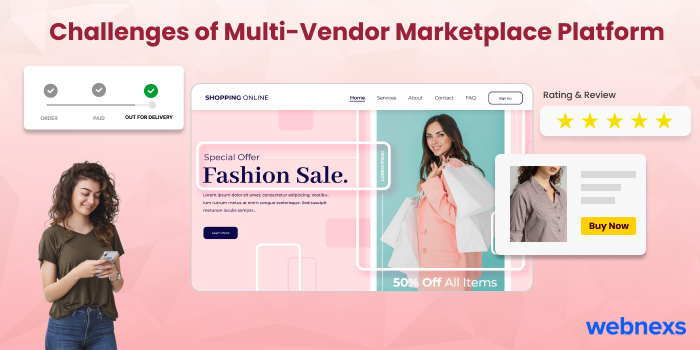
Building and managing a best multi vendor ecommerce platform can be an exciting opportunity, but it comes with its own set of challenges.
These platforms have the potential to greatly impact ecommerce, but addressing the obstacles along the way is essential for their success. From handling vendor relationships to maintaining strong security and smooth technical operations, each challenge requires careful planning and strategy.
Let’s explore these key challenges and why overcoming them is important for creating a successful and sustainable marketplace.
1) Vendor Management
Managing vendors is a central part of a multi vendor platform but also one of the hardest tasks. It involves recruiting vendors, making sure they meet quality standards, and supporting them in selling effectively.
Why It’s Important
Strong vendor management improves relationships and boosts platform efficiency, ensuring quality products and customer satisfaction.
Key Challenges
- Vendor Onboarding
Convincing vendors to join and ensuring a smooth onboarding process.
- Performance Monitoring
Regularly tracking vendor performance to maintain platform standards.
- Dispute Resolution
Addressing conflicts between vendors and customers swiftly.
How to Address It
- Use automated vendor onboarding tools to simplify the process.
- Implement rating systems to monitor vendor performance.
- Set clear policies to manage disputes effectively.
2) Competition
The marketplace space is highly competitive, with many platforms fighting to attract vendors and customers. To succeed, a platform must stand out with unique features and a strong brand.
Why It’s Important
Without differentiation, platforms risk losing vendors and customers to competitors.
Key Challenges
- Attracting high-quality vendors amidst stiff competition.
- Retaining customers by offering unique value.
How to Address It
- Highlight unique selling propositions (USPs) like exclusive products or better customer service.
- Offer vendor perks, such as marketing support or lower fees for early adopters.
3) Security and Fraud Prevention
Online marketplaces handle sensitive data, like payment information and personal details, making security a top priority. Fraud risks, such as fake listings or data breaches, also need to be controlled.
Why It’s Important
Security breaches can lead to loss of trust, fines, and potential platform failure.
Key Challenges
- Protecting sensitive customer and vendor data.
- Preventing fraudulent activities, such as fake reviews or chargebacks.
How to Address It
- Invest in advanced security measures like SSL certificates and two-factor authentication.
- Use fraud detection tools to monitor suspicious activities.
4) Payment Gateway Integration
Payments are a critical part of any multivendor marketplace platform. A smooth and secure payment system is essential for creating a good user experience.
Why It’s Important
Payment issues can deter customers and vendors, directly impacting revenue.
Key Challenges
- Supporting multiple payment methods for global reach.
- Ensuring secure and timely payouts to vendors.
How to Address It
- Partner with reliable payment gateway providers that support multiple currencies.
- Implement transparent payout systems with clear timelines.
5) Technical Infrastructure
A strong technical foundation supports the marketplace’s features and ensures everything runs smoothly, even as the platform grows.
Why It’s Important
Technical glitches can disrupt operations, reduce customer satisfaction, and damage credibility.
Key Challenges
- Handling high traffic during peak times.
- Regular maintenance to avoid downtime.
How to Address It
- Use scalable cloud-based hosting solutions.
- Partner with experienced developers for ongoing technical support.
Let’s look at Amazon Marketplace, a highly successful multi vendor ecommerce marketplace platform.
Real-Life Example: Amazon Multi Vendor Marketplace Platform
Amazon’s multi vendor marketplace is a prime example of success. In 2023, Amazon’s third-party sales reached $435.7 billion, with over 2 million active sellers. The platform’s ability to provide logistical and payment support has been crucial in helping vendors scale their businesses.
By following a similar strategy, you can also build a successful multi vendor ecommerce platform.
Conclusion
Choosing the right platform is the most important step in building a successful multi vendor marketplace platform. Your choice will directly impact how your business runs, grows, and serves both sellers and customers.
To make it easier for you, we’ve listed five of the best ecommerce marketplace platforms to consider. Among them, Webnexs stand out as strong option, offering great features and flexibility to match different business needs.
We hope you found this article helpful in choosing the right marketplace platform for your business.
Have questions or need help? Reach out to us to assist you in creating a successful multi vendor ecommerce marketplace! Feel free to contact us today!
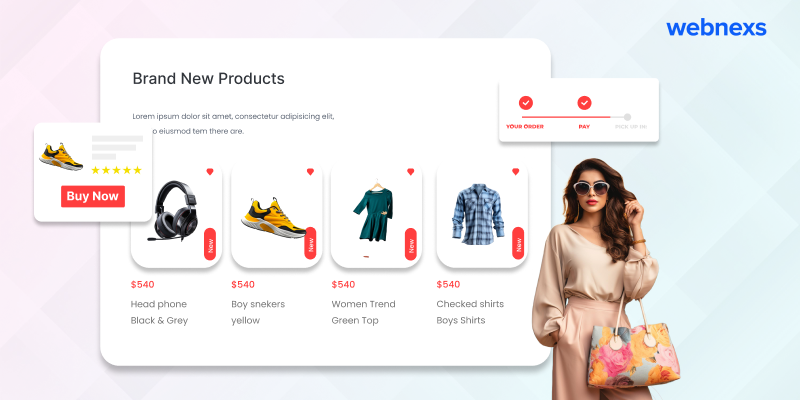





5 Responses
The blog is fantastic! Lots of great information about the benefits of developing a multi vendor marketplace platform. Keep updating all the blogs, as they will definitely help your readers!
Hey, very nice blog. I came across this on Google, and I am stoked that I did. I will definitely be coming back here more to learn more often about the benefits and challenges of multi vendor marketplace platform business, thanks for it.
I hope the benefits mentioned above make this solution a complete package among the marketplace modules available in the market today, especially when compared to the best multi vendor marketplace platform. isn’t it?
I wish to add to the conversation and bring a bit more to the table about the marketplace business and the best multi vendor marketplace platform, but I am just taking in as much info as I can at the moment. Thanks for sharing.
I’m extremely pleased to find this site. I want to thank you for your time on this fantastic read about the multi vendor marketplace platform!
I definitely savored every little bit of it, and I have you bookmarked to see new information on your site.